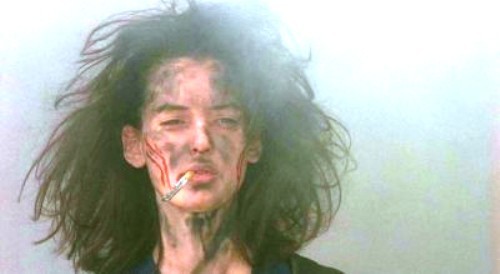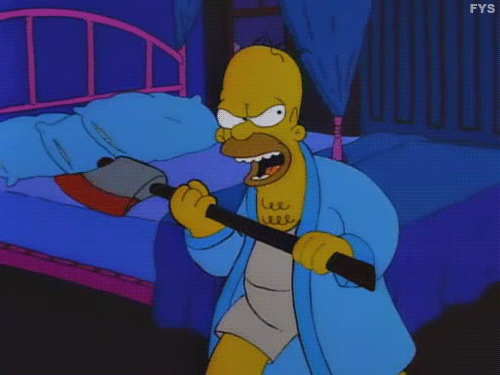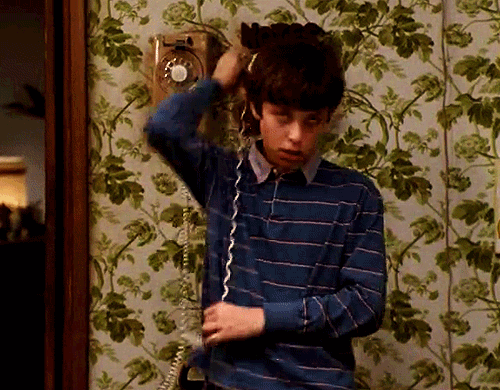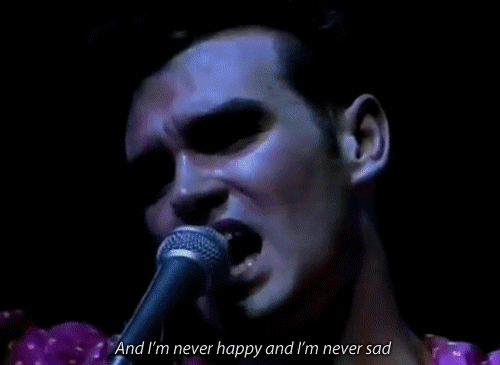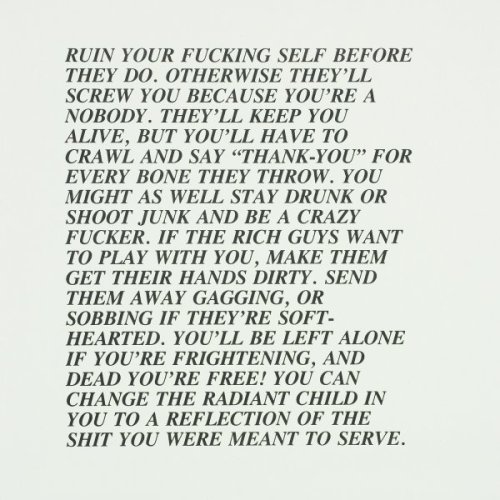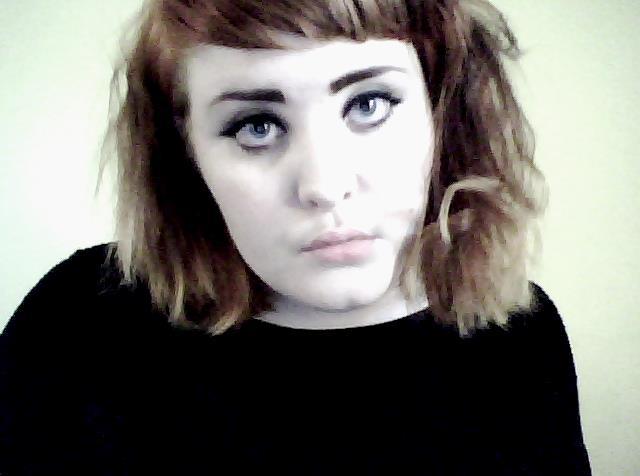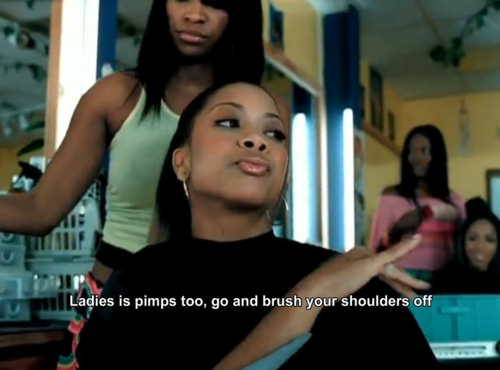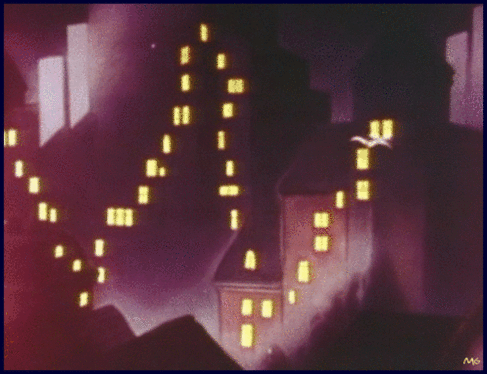I've decided to come out of my self-induced blog hibernation period in order to make a big post about Halloween, because Halloween is hands down my second favourite time of the year (Christmas comes first, obviously, because I am 12 years old inside forever and nothing beats eating and drinking as much as physically possible and watching 'Jingle All the Way' and other similar classics). Unfortunately, as much as I love Halloween, my attempts at celebrating it always seem to fall somewhat short - last year I dressed up as Veronica from Heathers (post-high school explosion, pre-cigarette and Martha Dumptruck befriending), expecting to elevate myself to this level of badass-ness:
Basically, I just wanted an excuse to have really big hair and constantly tell everyone to "lick. it. up." Unfortunately, I ended up looking less like Winona Ryder and more like Worzel Gummidge which, I mean...yeah, I guess that's kind of cool and Halloween-y and spooky and all, but it's not exactly the look I was going for. And Worzel Gummidge didn't have a cool catchphrase, and he definitely didn't chainsmoke a lot, so it was kind of a lost cause. I chickened out of dressing up, washed my poor attempt at 'soot' off my face, put on a black jumper with holes in, and told everyone I was a cobweb. No one was impressed. It was grim, to say the least.
The year before that was even more of a disaster. I went to London to visit my sister, and we started off the evening by drinking out of plastic skull shaped glasses and putting on too much eyeliner. We listened to the Monster Mash and made plans to go and see a friend's band, where dressing up was optional. I opted to yet again let my knitwear do the talking, by wearing a sweater which had a skeleton printed on the front. We saw the band, and everyone was dressed up, and everyone looked better than me (except for the guy who decided to dress up as Kurt Cobain, complete with gunshot wound - not cute, dude). However, I drank a lot and kind of numbed myself to the embarrassment of being half a skeleton, and we had fun - that is, until I decided that it would be a totally awesome idea to travel to the other side of London to attend another Halloween party with some friends, and my sister decided that she wanted to go home and sleep, a lot. So she went home, and I went and got more drunk and felt even more inadequately scary than before. I remember almost falling asleep on the dance-floor due to extreme alcohol intoxication and trying to pass it off as part of my costume, before finally deciding to drag myself onto a night bus heading towards my sisters flat. This is where the story gets truly scary - I made it back to the flat, and rang the doorbell. No one answered, and after bashing on the door drunkenly for what felt like years, I creeped over to my sisters window and looked in. The curtain was open and I could see that she was fast asleep. I bashed on the window and screamed and yelled drunk things until it became obvious that she wasn't going to wake up. By this point it was almost 5am, and I remember calling my mum in tears - sobbing about how my sister was asleep, I was abandoned on the streets of London, I was dressed as half a skeleton, and I hated my life. My mum told me to get the first train back, so I got on another night bus to Euston, and by the time I reached the station being dressed as half a skeleton was the least of my worries, because I looked like a legitimate zombie. A zombie with a horrible drinking problem.
So yeah, I think it's fair to say that my previous Halloween experiences could have been better. The past few years of continually bad costumes, drunk mistakes, and lack of pumpkin pies have made me realise that nothing is better than Halloween when you're young - the excitement of working on what you know will be a totally awesome costume, the thrill of being allowed to go Trick or Treating without the supervision of your parents or irritating older neighbours, and letting yourself be totally terrified by a scary movie that you know you're not quite old enough to watch. Or, failing that, watching endless reruns of The Simpsons' Treehouse of Horror episodes and Are You Afraid of the Dark? whilst eating the best of the treats you hauled in, and making sure to blacklist the name of whoever gave you that packet of Polo mints. There's also that feeling you get during Halloween when you're young - that feeling that, although you know logically that monsters and zombies and vampires probably don't exist, this time of the year makes you doubt everything - that anything could happen. The world is a little bit scarier than usual, but in a different way - all of your usual, boring, real-world fears fade into insignificance when compared to the positively exotic ideas of zombies, and vampires, and werewolves. There's also the idea that these fears can be combated, that you can show the world how brave you really are - that you can step outside of yourself and be a spooky, supernatural hero for one night only.
So I've decided that, as a tribute to the best Halloween's I ever had, this Wednesday I'm going to spend my evening baking pumpkin pies, handing out the best treats I can find to the monsters at my door, carving faces into pumpkins, dressing up as something terrifying (even though I don't plan on leaving my house), and watching the shit out of a bunch of truly scary TV shows and movies. If you want to spend your evening experiencing a good bout of nostalgia, too, then here is a list of spooky things that you cannot go wrong with:
There's no way that I couldn't include this, and there's no way that it wouldn't be first on my list. Goosebumps was the first scary book series that entered my life, and for that it will always hold a special place in my heart, but Are You Afraid of the Dark? was the first TV show that genuinely scared me - and it scared me so well that for a long time, I was certain that my hometown was going to be taken over by a team of terrifying vampire, as seen in The Tale of the Nightly Neighbours. This was the first episode of AYAOTD that I saw, and I remember clearly the scene where the protagonist, a young girl called Emma, watches the arrival of her new, creepy neighbours from her window and feels a chill of excitement - watching them unpack their strange belongings, she hopes that they will 'shake things up' in her tiny suburb. I remember sitting on the swing in my small back garden one boring summer, and the same thought crossed my mind - and as soon as it entered my head I was taken over by fear and I spent the whole summer trembling and paranoid that I would soon be dealing with some nightly neighbours of my own. The effect the TV show had on me was that profound and terrifying, which I guess is kind of embarrassing to admit now, as looking back on it now, the show is obviously more campy than creepy. However, that doesn't take away the fear that many of us felt when watching this show as youngsters, and some of the characters remain as disturbing today as they did when we first saw them. I mean, the weird sea monster in The Tale of the Dead Man's Float? I would not want to run into that bitch in a dark alleyway - or anywhere, in fact.
SERIOUSLY. Just be grateful I didn't choose a close-up.
The Simpsons Treehouse of Horror
If I haven't yet written an ode to The Simpsons and how it has affected my life on this blog, then please forgive me for my laziness. I grew up watching The Simpsons - it first aired over here in the year that I was born, and my best childhood memories all involve sitting in front of the television with my grandad, waiting for The Simpsons to start. I'm even watching it now as I write this post (Itchy & Scratchy & Marge, in case you're curious). I feel as though anyone who grew up in the 90s with a less than perfect, dysfunctional family can relate to The Simpsons and the humour it uses. The Treehouse of Horror episodes are no exception - they're hilarious, they can be creepy, and they're also very, very clever. One of my favourite segments from the entire Treehouse of Horror back catalogue is definitely Bad Dream House, in which the family move into a haunted house and spend the majority of their time living there trying not to kill each other. The highlight of the episode for me comes at the end, when the house is told that The Simpsons will be living there and the house must therefore respect them. After allowing the house a few minutes to mull it over, it then explodes, after which Lisa comments, "It chose to destroy itself rather than live with us". So there you have it - dysfunctional families are definitely more terrifying than ghosts or haunted houses will ever be.
Another of my favourite Treehouse of Horror segments is The Shining send-up, in which Homer becomes the character played by Jack Nicholson. The segment uses many of the tropes seen in the film version of The Shining, including the infamous axe scene, but my favourite part has to be when Homer remarks that "no tv and no beer make Homer go crazy". I can relate to this a lot - I'm sure that living away from the majority of the human race in a deserted hotel on a mountain wreaks havoc with your mental health, but surely it would all be a lot more bearable with the addition of beer and television.
Freaks and Geeks Tricks and Treats
This episode of Freaks and Geeks is hands down one of my favourite things to watch during Halloween.
Everything about it is perfect - the homemade costumes, Bill's insistence as the bionic woman that "these are all mine!", Gonna Raise Hell playing during the freaks' car trip and pumpkin smashing escapades, and the heartbreaking moment when Lindsay accidentally eggs Sam, her own brother. In his cute little robot costume, Lindsay! How could you? As much as I want to be a freak and get high all of the time and be a total badass, deep down I know that during my time at high school I could definitely relate a lot more to Sam and his group of geeks - so that egging scene really gets to me, as does the scene when Alan and his cronies beat up the geeks and steal their candy.
This episode also makes awesome use of two of my favorite characters, Sam and Lindsay's parents. One of my favourite parts of the episode definitely has to be when Lindsay ditches her mum's halloween plans (which include dressing up as a princess and handing out home-baked cookies to trick or treaters- I seriously don't know what's up with Lindsay in this episode, because that sounds like a dream to me) to hang out with the freaks, so Lindsay's dad makes a special effort and dresses up in the vampire costume Lindsay's mum has made for him. I honestly cried with laughter when he first pops out from behind the front door and genuinely terrifies the little trick or treaters. At the end of the episode, Lindsay realises her error and returns to the family home, where she dresses up and helps her mum with the Halloween treats, which leaves even my tiny cold heart feeling warm and fuzzy.
Flawless human beings.
As well as watching these three TV shows on Halloween, I also plan to drink a lot of creepy cocktails, bake an awesome pumpkin pie (although you know it'll definitely be made from tinned pumpkins and Jus-Roll pastry), watch some genuinely creepy films on Netflix, and dress up as some kind of weird spooky creature, taking my main inspiration from Sharon Needles - and there won't be a half-skeleton costume or cobweb jumper in sight. Happy Halloween!


